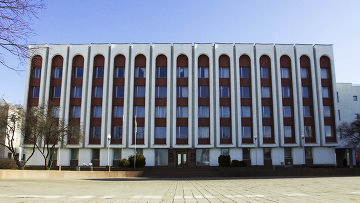
The Nagorno-Karabakh conflict can be solved only peacefully, said Dmitry Mironchik, press secretary of Belarusian Foreign Ministry, Belta news agency reported Apr. 4.
The OSCE Minsk Group is to hold a meeting on the Nagorno-Karabakh conflict’s settlement Apr. 5.
Explaining the stance of Belarus on the issue, Mironchik recalled that the Ministry of Foreign Affairs made a statement Apr. 2 on the aggravation of situation around Azerbaijan’s occupied Nagorno-Karabakh region.
Belarusian side’s key position is a clear call to refrain from the use of force or threat of force in international relations, as reflected in the UN Charter and other authoritative international documents, said Mironchik.
“There is still confidence that the Nagorno-Karabakh conflict can be resolved only by peaceful means and in accordance with universally recognized principles and norms of international law,” he added.
On the night of Apr. 2, all the frontier positions of Azerbaijan were subjected to heavy fire from Armenians, who were using large-caliber weapons, mortars, grenade launchers and guns. Azerbaijani settlements near the frontline densely populated by civilians were shelled as well.
A counter-attack was carried out following the provocations of the Armenian armed forces on the night of Apr. 2.
Six Armenian tanks, 15 gun mounts and reinforced engineering structures were destroyed and more than 100 servicemen of the Armenian armed forces were wounded and killed during the shootouts.
Twelve servicemen of the Azerbaijani armed forces heroically died, one Mi-24 helicopter was shot down and one tank was damaged on a mine.
Three more soldiers of Azerbaijan were killed during the past day and night as a result of the ceasefire violation.
On Apr. 4, Azerbaijani armed forces destroyed three tanks and eliminated around 30 servicemen of the Armenian armed forces.
The conflict between the two South Caucasus countries began in 1988 when Armenia made territorial claims against Azerbaijan. As a result of the ensuing war, in 1992 Armenian armed forces occupied 20 percent of Azerbaijan, including the Nagorno-Karabakh region and seven surrounding districts.
The two countries signed a ceasefire agreement in 1994. The co-chairs of the OSCE Minsk Group, Russia, France and the US are currently holding peace negotiations.
Armenia has not yet implemented the UN Security Council’s four resolutions on withdrawal of its armed forces from the Nagorno-Karabakh and the surrounding districts.
Trend
